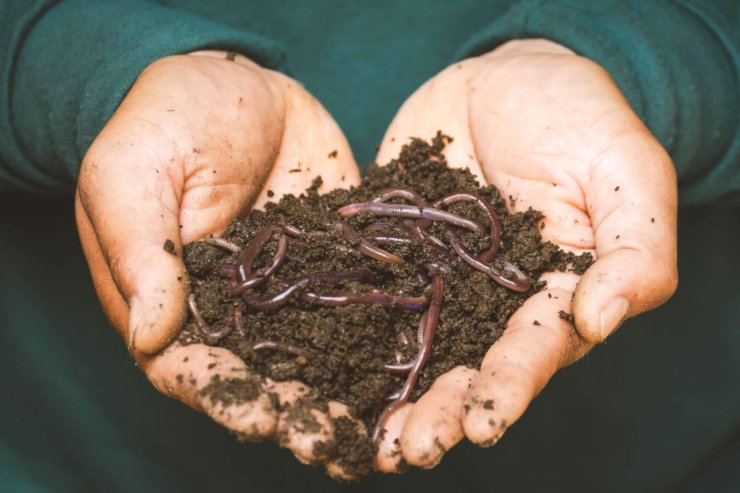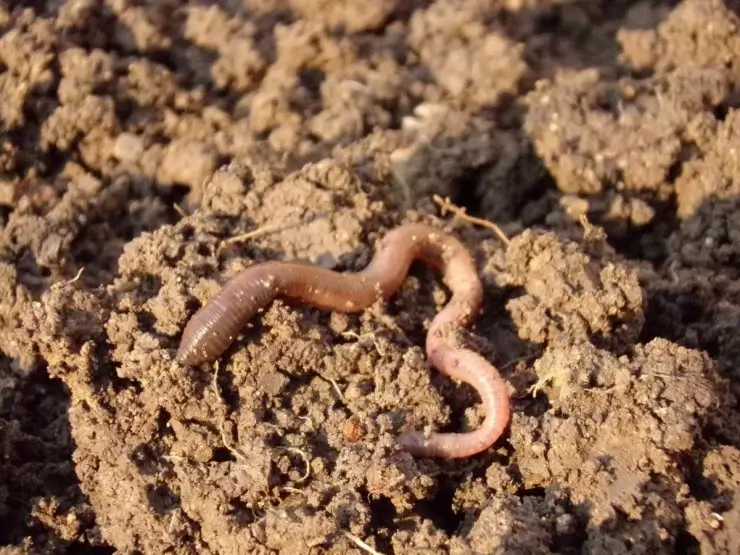
You know worms can be valuable additions to the soil. You know earthworm poop (excuse me, castings) make excellent nutritional additives to any garden. So it seems pretty clear. Should I add worms to my garden? Yes, of course. Except.
If the answer were that straightforward, this would be a mighty short blog post. But it’s not that simple. You see, a worm is not just a worm. There are different species, and some are invasive and quite destructive.
Discover 7 top tips for growing, harvesting, and enjoying tomatoes from your home garden—when you access the FREE guide The Best Way to Grow Tomatoes, right now!

Earthworm
Image courtesy of University of New Hampshire.
Should I add worms to my garden (and other essential questions about worms)
Should I add worms to my garden? Even though it seems like the answer would be yes, it’s actually not ideal to add worms to your garden. I realize that doesn’t make a lot of sense, given that worm poop castings are so nutritious. And since worms can help aerate the soil as they go about their day. And since they break down organic matter. And since … well, you get the idea.
Interestingly, however, earthworms are not native to the Northeastern United States, and may not be native to North America at all (though there is some conflicting information on this). Obviously, they are well established, and we aren’t getting rid of them anytime soon. But in high enough concentrations, they can disrupt local ecosystems.
Even worse, the good old nightcrawler isn’t the only invasive earthworm around. Asian jumping worms (which you can read about here) can be especially destructive.
There are also redworms or red wrigglers, which have a reputation as excellent composters. These worms are ideal for vermicomposting (which I’ll get to in a minute), but to quote the University of New Hampshire, “they have the potential to escape into forests and become an ecological threat, and should not be used in outdoor compost piles.”
At this point, you might wonder why it matters if there are already so many worms around, so let’s move to the following questions.
Should I add worms to my garden to supplement worms that are already there? After all, if you already have worms, how much difference will another couple dozen make?
There’s one very interesting thing about worms in your garden. If you have good soil conditions, worms will magically show up. Okay, it might not be magic, but earthworms enjoy many of the same soil conditions your garden vegetables also enjoy. Moist but not wet soil with plenty of organic matter is ideal for your plants and attracts worms. So you don’t need to import worms to have a healthy population of worms in your garden.
I already have worms; how do I keep them? The best way to keep your garden worms happy is to take care of your soil just as you would for your plants. However! Colorado State University points out that chemical pesticides and herbicides can potentially kill off an entire population of earthworms. They also mention that regularly tilling your garden “can reduce earthworm populations by as much as 90%.”
Incidentally, no-till gardening is quite the rage in some gardening circles. You can read a little about it here.
What about vermicomposting? Vermicomposting is the practice of using worms specifically to compost. It’s a great way to get the benefits of worm castings and quick compost action while keeping your worm population contained. Containers like the Subpod Mini are popular, or there are options like the self-contained VermiHut Compost Bin.
Where do you get the worms? If you buy worms, it’s important to know what you’re getting. For that reason, it’s best to buy locally if you can or ask your local extension program for recommendations. Aside from that, look for red worms or red wrigglers, as they are known for their composting prowess! Utah State University recommends Eisenia fetida, Eisenia andrei, or Lumbricus rubellus.
What’s your opinion on this? Do you think it’s worth adding earthworms to your garden? I’d love to read your thoughts in the comments.
Note: Food Gardening Network contains links to affiliate websites, including Amazon and Rakuten Affiliate Network, and we may receive a commission for any eligible purchases made by you through links on this page. Any reviews are based on honest reviews of the products.
Discover 7 top tips for growing, harvesting, and enjoying tomatoes from your home garden—when you access the FREE guide The Best Way to Grow Tomatoes, right now!





I live in South Florida where it is very hot in the summer and not cold in the winter. I have 2 raised beds for vegetables. We can’t seem to get the soil PH right. It is very alkaline, despite adding some peat moss and acidifier. Would earthworms survive here? I have never seem one here.
What harm could occur by adding earthworms to grounds with plants growing in it? In an urban area how can Red Crawlers do dammage, there is no forest around. I have a small worm farm, and use the castings for garden and plants. My thinking was to put a few in various places where there are things growing.